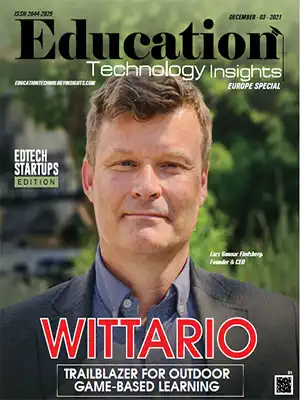THANK YOU FOR SUBSCRIBING
Be first to read the latest tech news, Industry Leader's Insights, and CIO interviews of medium and large enterprises exclusively from Education Technology Insights
The key to successful EdTech partnerships? Slow, steady and supportive
Dan Sandhu, CEO, Sparx
 Dan Sandhu, CEO, Sparx
Dan Sandhu, CEO, SparxIn April, the Department for Education issued a new Edtech Strategy with one of the key messages throughout being the importance of partnership. It is referred to 15 times in the strategy, and in most instances, it is about schools working with the edtech community. It’s a subject close to my heart because at Sparx we worked with our partner schools for eight years before launching our first product, Sparx Maths in September 2018.
Working with three local schools, we have been in our Partners Schools every day, observing, listening, and getting real-time insight and feedback. Our shared goal has been to improve the quality of maths for students, and it is satisfying that in these schools, we can see measurable improvement. The partnership has demanded total trust and respect, a willingness for each of us to step out of our comfort zones, and a recognition that we would not always get things right.
This last point is probably one of the biggest lessons that Sparx has learned in the past eight years. When things have not gone as expected our partnership has meant we can easily ask: “Why do we think that might be?” and be sure of getting a well-informed and useful answer.
So, if you’re thinking about partnering with a school, or schools, what are the conditions for success? I believe there are five.
1. Schools’ infrastructure
Ensure the technical infrastructure is in place to support the technology you require. I know this may seem obvious, but my experience in working with tech companies for 20 years suggests it can be overlooked. Also, undertake a proper audit at the school rather than relying on what staff thinks may be the case.
2. Think small and slow
Once you’re confident, the technical infrastructure is in place, design a short trial, and try not to be in a rush! I know it is counter-intuitive, but at this point, the trial is as much about building relationships and working together, as it is about delivering all answers in one go.
3. Find champions and support them as much as you can
Edtech demands that individuals change the way they work and take on new approaches. In the early stages of working together, I recommend you select full-time teachers who are interested in technology and reasonably confident. These individuals can then start to act as your representatives in school and help to champion what you are doing.
4. Listen and be available
It is essential to establish a culture where feedback and different views are noted and acted upon. Our partner schools tell us that our positive approach to feedback differs from many other organizations with which they work.
5. Maintain the momentum
Schools are busy places, and teachers have lots of priorities. We have found that without regular contact, things can slip down the to-do list and start to flounder. Our partner schools appreciate a ‘nudge,’ as one head teacher said: “It helps us to keep on top of things.”
Politics can change fast, not least in the UK, so it is uncertain how long the government’s edtech strategy will hold sway. However, whatever its fortunes, the need for edtech companies and schools to work in partnership is much more than just a political buzzword, it’s a necessity.
Weekly Brief
ON THE DECK
Read Also
Localising Curriculum, Globalising Opportunity
Elevating Education with Purposeful Tech-Integration
Digital Transformation with User-Centric Solutions and Collaborative Leadership
Connecting Education and Technology for Lasting Change
Putting Students First in a Global Classroom
Balancing Technology-Driven Teaching with Traditional Learning

I agree We use cookies on this website to enhance your user experience. By clicking any link on this page you are giving your consent for us to set cookies. More info



























